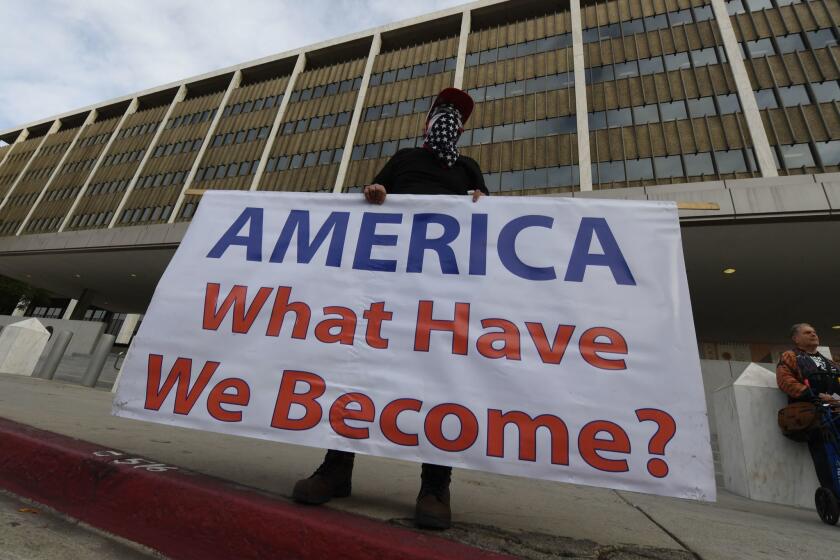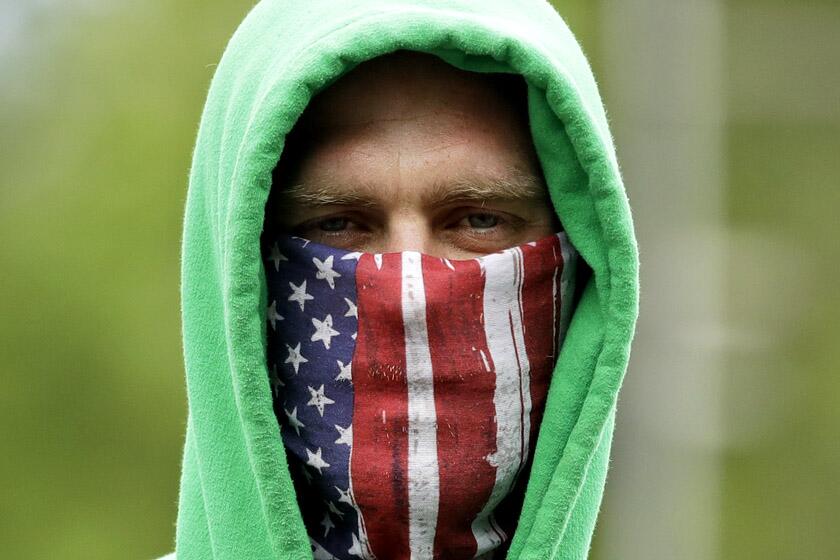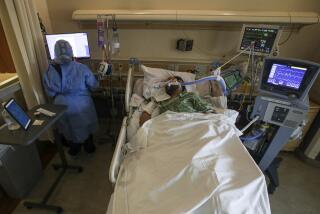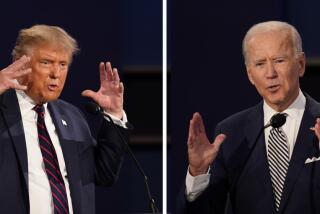COVID-19 deaths could swing the election to Democrats, study says

Donald Trump has called himself a “wartime president” for leading the fight against COVID-19. He has called Americans “warriors” for showing up at their jobs, shopping in stores and generally getting the economy back on track despite knowing that these activities increase the risk of a coronavirus infection.
The metaphor is apt, in that our war on COVID-19 has resulted in substantial casualties — more than 229,000 dead and counting. That’s more double the 90,220 deaths Americans suffered throughout the Vietnam War.
For the record:
12:01 a.m. Oct. 31, 2020An earlier version of this story said Donald Trump won New Hampshire in the 2016 presidential election. He lost the state in a close race.
During the Vietnam years, there was a clear correlation between the number of combat deaths suffered by a county and the degree to which residents backed the conflict — when deaths went up, support for the president’s war policies fell, researchers have found.
Likewise, voters in areas that suffered more casualties during the Iraq War were less likely to vote for Republican congressional candidates in the 2006 midterm elections, while voters in areas that took more casualties in Afghanistan were more likely to support Trump for president in 2016 instead of former Secretary of State Hillary Clinton.
Now political scientists are seeing the pattern again — except this time the war is happening on U.S. soil and the foe is COVID-19.
“Increasing fatalities from the disease leads to losses for Republicans,” a team from George Washington University and UCLA reported Friday in the journal Science Advances.
The researchers used data collected by the New York Times to tally COVID-19 deaths in every state up through May 31. They also looked at responses gathered by the Democracy Fund + UCLA Nationscape Project, a public opinion survey that reaches about 6,400 people each week.
They found that people in the states with high COVID-19 fatalities were 3% less likely to support Trump’s reelection than were people in states where the coronavirus had made little impact. They were also nearly 13% less likely to favor GOP candidates for Senate seats and 5% less likely to back GOP candidates for the House of Representatives.
Scientists explain how our politics got so bad that we can’t come together to confront common threats like the national debt, climate change and COVID-19.
That was just their starting point. To look more carefully at the relationship between deaths and political preferences, the political scientists compared COVID-19 deaths in the previous 30 days with changes in support for Republican candidates in a state or even county. This allowed them to account for the influence of factors like voters’ race, ethnicity, gender, education and who they voted for in the 2016 presidential election. It also helped them see whether COVID-19 deaths were actually causing voters to turn away from the party controlling America’s response to the pandemic.
The results were clear.
“Overall, areas with higher COVID-19 fatalities are significantly less likely to support President Trump and other Republican candidates,” they reported. This pattern was seen “at every level of geography and for every office.”
The degree of lost support was small, but it may be enough to swing an election in a close race, the researchers wrote.
For instance, if COVID-19 deaths in a county had doubled over the previous 30 days, voters in that county became 0.14% less likely to support Trump’s reelection, 0.28% less likely to support Republican Senate candidates and 0.22% less likely to support Republicans running for seats in the House.
Additionally, if COVID-19 deaths in a state doubled over the previous 30 days, people in that state became 0.37% less likely to say they’d vote for Trump, 0.79% less likely to say they’d vote for a GOP Senate candidate and 0.58% less likely to say they’d vote for a Republican House candidate.
The political scientists noted that in 2016, Trump carried Michigan by a margin of just 0.2%, and he lost New Hampshire by a mere 0.4%. In Florida, Republican Rick Scott unseated Democrat Bill Nelson in a 2018 Senate race with an advantage of less than 0.2%.
If nearly all Americans would wear face masks when they leave their homes, they could save over 100,000 lives by the end of February, a study says.
Indeed, COVID-19 casualties could be even more influential than the health of the economy, the study authors wrote.
“Just as the public penalizes the president for casualties during wars, the public is penalizing the president and other members of his party for local fatalities during the pandemic,” they concluded. “This could swing the presidential election and the U.S. Senate toward Democrats, with particularly high effects in swing states such as Michigan, Wisconsin, Pennsylvania, New Hampshire, Arizona, and Florida.”









